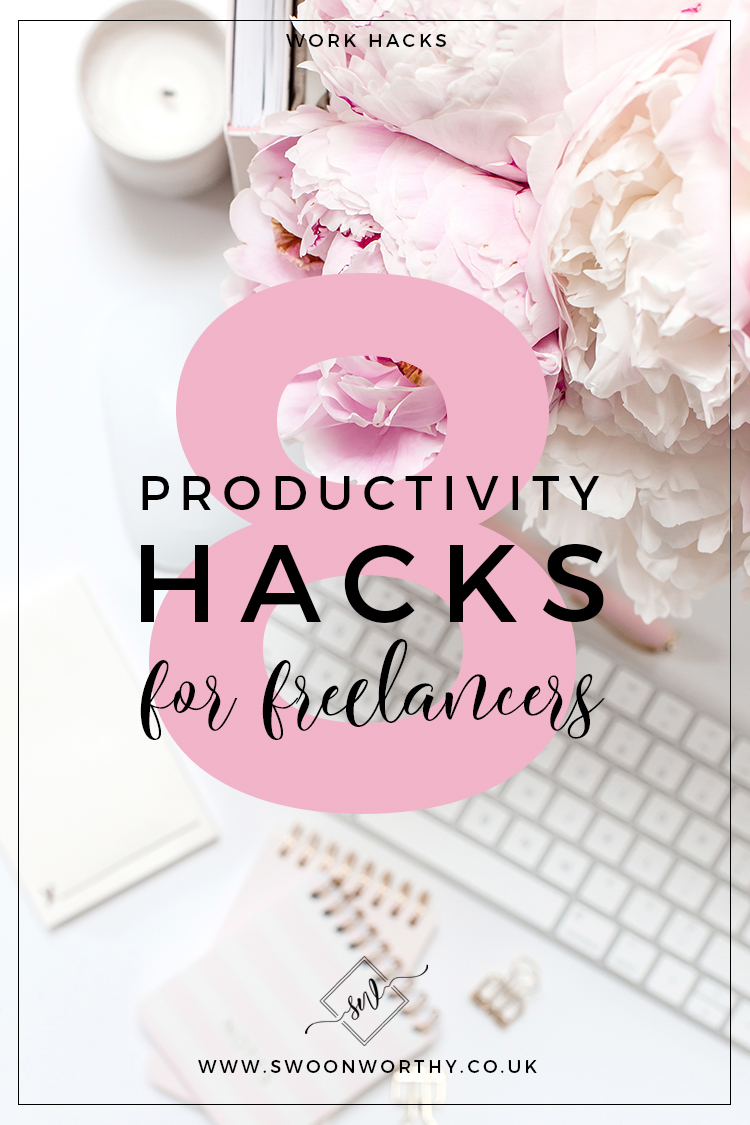For all the many, many joys of working for myself, it does have its occasional downsides. Staying motivated when you have no one to answer to but yourself is one of the more difficult ones. I admit, there are some days where I get to the end of the day and wonder what in the world I accomplished. It happens.
But after nearly 5 years of freelance life, I feel like I’ve been able to recognise when I’m simply feeling unmotivated and how to make sure I get done what I need to. I figured for those of you who might also work for yourself, the tips I’ve learned over the years have helped me immensely so I figured I’d pass on what I learned.
Get Into Batch Working
This is probably one of the best things I started doing a couple of years ago and I still do it to this day. I allocate certain days to working on my own blog, blocks of time for admin work, days for my freelancing clients and soon, days for my Finishing Touch styling service clients. I used to schedule different aspects of my work across the day and it was always hard for me to make a mental switch from one job to another. So having dedicated days to only work on one thing – or at the very least, a full morning to work on something specific like chasing invoices, updating my budget or planning my content calendar and scheduling really helps.
At the moment, I work on Swoon Worthy posts on Mondays (writing) and Fridays (shooting), Tuesdays will be allocated to Finishing Touch clients, Wednesdays and Thursdays are freelance writing for blogging clients. I’m quite flexible with this but this is how I sent up my calendar and it works well for me. I found, for instance, that I used to do client work on a Monday but swapping these to mid-week makes me feel more excited to be working on my own blog Monday morning. There are even weeks where I can schedule in a half day for Friday and take the afternoon off – living the dream right there! Ha!
Set Up an Online Calendar
This seems like an obvious one but for years, I had a really simple Excel Spreadsheet as my calendar which I could only access from my laptop. I know – so dumb but I’d been doing that for years and finally realised how difficult I was making things for myself.
Of course, different kinds of schedules work for different people but for me, I prefer something rather simple. I use DayViewer which is a pretty simple online calendar which pretty much does everything I need it to do. I can, of course, schedule appointments and tasks in it and tag different types of work so at a glance (or a quick click of a tab), see only certain types of work, only appointments, and the like. I can also access it from any device which is handy if I’m out and about.
You might use something like Trello to keep track of tasks or Asana if you need to keep organised with a team or perhaps you just like the simplicity of a physical calendar that you carry around with you. Whatever you do, however, make sure it’s something that’s easy for you to use and is easily accessible no matter where you are so the overwhelm doesn’t set in and you can schedule out your workload easily.
Prioritise Your Work Load
We all have about a million small things that need to get done on a daily, weekly or long term basis and it’s so easy to get overwhelmed thinking that everything needs to get done immediately so it’s really important to prioritise. I normally set 2-3 goals per day in my calendar and then have a running list of other things I need to get to that week. These are the biggest tasks for my week and prioritised by deadline. Having them on a list and ticking them off is quietly motivating for me and it also ensures that the most important tasks aren’t left until last.
But how do you know what’s most important? It’s so easy to be distracted by an overflowing inbox or think that we need to listen to every business podcast or keep up with every comment on social media. The truth is, we don’t. I try to prioritise with two simple ideas: How urgent is this? How important is this? If there’s an intersection of both, of course, those will be at the top of my goals list. Yes, listening to those business podcasts are great but they are neither important nor urgent so they will be deprioritised. The inbox may be urgent but not important – so I’ll schedule some time in my day (or week) to respond without guilt. Long term goals tend to be important but not urgent so it’s wise to schedule time to tackle these things too or else the ‘urgent but not important’ things will take over and you’ll never get them done.
Create a Reward Strategy
If I’m feeling particularly unmotivated that day, I will play a little game in my head which essentially goes, “If you do [x] for [y amount of time], you will get to do [z]”. This is basically having a reward strategy in place so I might tell myself that if I spend 1 hour on a freelance writing gig, I can spend 30 minutes looking for art for the dining room (and yes, I love decorating my house so for me, that’s enjoyable). I will set timers for myself for everything so I know I won’t get carried away doing my task unrewarded (and feeling bitter about it) or that I won’t continue looking at art for the dining room for the rest of the afternoon.
I also use money as a motivator. So, let’s say I need to write up a blog post for a freelance client on a subject that I’m just not feeling at the moment. I ask myself, “If someone was sat there with my fee in their hand and they’ll give it to me in cash as soon as I’m done, would I do it?” The answer is always yes. It’s easy to think about money in the abstract, especially when that reward doesn’t seem to come until 30 days later but consider it as a concrete, real thing. You do x task, you get y money in return. It seems so simple but it’s far too easy to disassociate the two so reaquaint yourself with the formula.
Schedule Breaks
Now this seems counter-productive to, well, productivity, but everyone knows that if you work too much, you’ll easily be distracted at the best of times or burnt out completely at the worst of times. In my days of working for other people, break times were scheduled as a normal part of the day but without anyone reminding me it’s well past lunchtime and I still haven’t eaten my breakfast. I can struggle with remembering that breaks are good for both body and mind.
Of course, there will be times when something urgent needs doing but if you find yourself regularly forgetting to take breaks (instead popping over to Facebook because you’re looking for an excuse to procrastinate), then get those in your calendar or set a timer on your phone to remind yourself.
I sometimes completely forget to even leave my desk at times but when I’m feeling particularly unmotivated, I will give myself the reward of a break once every few hours. Knowing my scheduled break is coming makes me feel better about getting on with the task at hand knowing there’s a fixed deadline when I can finally relax a bit again.
Turn off Your Notifications
This is a big one for me. About a year ago, I decided to just get rid of all the notifications from my phone for social media. The only ones I have now are text messages and Whatsapp but I’m now considering getting rid of those ones too because really, they are almost never urgent. Even just removing the ‘zzz zzz’ or ‘ding’ every 20 seconds felt like a weight had been lifted. When I have the time, I’ll go on to my social media and I can respond or read then but not while I’m trying to get things done.
You might also want to shut down open tabs for social media, your inbox or anything else you find particularly tempting while you are working – or better, completely sign out of the apps if the temptation is too great. If, like me, social media is part of your work then schedule times to look at it. I normally start off my mornings with 30 minutes of responding to comments and emails and then I shut them down again until I’m finished my first big task of the day.
Figure out your peak working times
It’s funny that for many of us coming out of working in offices, we think our working day has to be 9-5 because that’s what’s always been drilled into us. But the truth is, when you are a freelancer, there’s no reason you have to stick to a schedule that rigid. Of course, creating some kind of work schedule will assist you in making you more productive, but the beauty of being a freelancer means we get to set our own hours for what works best for us and our individual responsibilities.
Now, for me, I know that I’m much more productive first thing in the morning and around 8:30-11am is when I feel the most motivated. From around 1pm-3pm, I hit my slump and then I’m back feeling a bit brighter and more effective from around 4pm until the end of the day. You may find you work better in the evenings and your peak may be from 7pm-9pm. Or maybe you’re a bit of an early bird and find you do your best work before 8am. Whatever your peak times are, choose to do the hardest or most crucial tasks during this time and then save the easier/less stressful stuff for your least productive hours.
Get Your Automated Systems in Place
Finally, I would recommend automaticing processes wherever you can. I use Hootsuite for scheduling tweets, Tailwind for scheduling Pinterest and Later for scheduling Instagram posts. There are so many different scheduling systems for social media out there so find one that works for you. These are a huge time saver and it means you aren’t posting ‘on the fly’. There’s nothing worse than ending your day and realising when you’re all cosied up on the sofa ready to get your Stranger Things on that you’ve forgotten to post anything all day.
I could probably go on with another 8 ideas but I’m going to leave it there for now! Are you feeling more productive already? Anything you do to make yourself more productive as a freelancer? Always looking for ideas so hit me up in the comments!





















It’s funny because in my head I know I should be doing all of these! But do I? Erm…next question please. I want to use this summer to get my automating head on and look into scheduling Instagram so that’s one less thing to worry about – also, I’ve let batch working slide recently so that needs to come back! Fab post lovely xx
Thank you!
I’ve been stuck in a seriously unproductive rut lately.
I can’t wait to give your suggestions a try.
In another case of Google reading my mind or perhaps just your timely posting, but this couldn’t have come at a better moment. As I was lying in bed avoiding three blogs I’d been putting off writing, your post came up on my news feed.
The “subject I’m just not feeling” spoke to me particularly today! So useful – I’ve sectioned off and allotted time and breaks and it all feels more manageable already. I love the reward idea, which I’d been doing to push me through without even realising.
I also find I do a lot of trying to forgive for those unproductive days, rather than beating myself up. The berating mostly just stops me getting going the next day.
One blog down, two to go. Thank you!
I work so well with a reward strategy. I used to eye roll at the idea, but the promise of a scoop of ice-cream if I get some work done is definitely helping in this heat!
xoxo
Jess
The Crown Wings | UK Travel & Lifestyle Blog
Thanks for the tips, Kimberly! I like the little reward scheme. I may treat myself to some chocolate if I reach my daily goals :-)